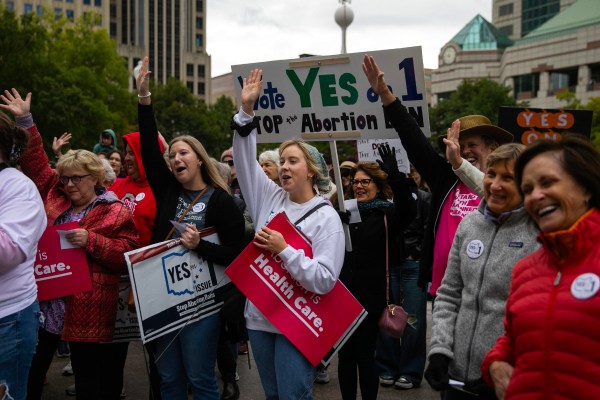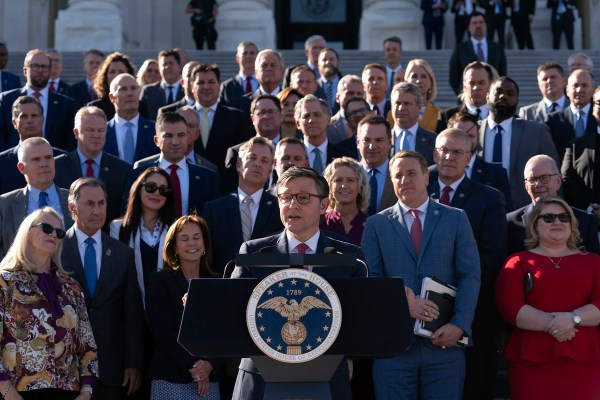This column first appeared in The Amendment, a new biweekly newsletter by Errin Haines, The 19th’s editor-at-large. Subscribe today to get early access to future analysis.
This week I’ve asked The 19th’s politics team to answer some of the questions you, our readers, shared with us.
I keep reading about how people are concerned by President Joe Biden’s age. Why aren’t people talking about Vice President Kamala Harris replacing him and running for president?
Biden was first elected president when he was 77 years old; a few weeks after Election Day 2024, he’ll turn 82. Many Democrats have said they’re concerned about his age. It’s worth noting that the likely GOP presidential nominee is former President Donald Trump, who will be 78 next year. If one of them wins the presidency, he is set to be the oldest person to be president at the end of his term.
Biden’s staff has pushed back on concerns about his age, and Biden himself has cracked jokes about it. But you’re right that there hasn’t been much — if any, really — talk about Harris replacing him. Harris’ approval ratings are about as low as Biden’s, though she does have strengths with younger voters and voters of color that Biden doesn’t. We saw this in the latest polling from the New York Times and Siena College, which showed about 11 percent of people who said they’d vote for Harris for president wouldn’t vote for Biden. These are definitely signs of weakness for Biden — but we’re still almost a year out from the presidential election, and replacing him on the ticket would also be a sign of weakness. That’s not the signal the party wants to send to voters.
Besides, right now it’s probably too late for someone to get into the presidential race; the deadlines to get a name on the ballot in some states have already passed.
— Terri Rupar, political editor
Ohio’s Republican legislative supermajority has said it is not OK with what voters decided last week on both abortion and marijuana. What do we know about what’s going to happen next?
Ohio voted to guarantee a right to abortion and other reproductive health care in the state Constitution by a decisive 13 points last Tuesday — and many GOP state lawmakers didn’t take it well.
The state Senate president, Matt Huffman, declared that it was only the start of a “revolving door” of ballot measures to repeal the measure, Issue 1.
A group of Ohio House GOP lawmakers issued a news release asserting that voters were “misled” by the amendment, claiming without evidence that there was “foreign interference” in the vote and threatening to strip the courts of the authority to interpret and enforce the amendment.
This is all after Republicans in Ohio tried, and failed, to thwart Issue 1 with a ballot measure in August that would have raised the threshold to pass citizen-led amendments.
-
Read Next:

-
Read Next:
Ohio votes to guarantee abortion rights in its state Constitution
The lawmakers’ claims hold little legal weight and their attempts to subvert the judiciary are a non-starter, legal experts and scholars say. Their efforts also aren’t likely to find favor with GOP Gov. Mike DeWine, who has said he accepts the outcome of last Tuesday’s elections.
But the speed and severity with which some lawmakers have openly moved to undo the will of the voters — and kneecap Ohio’s system of checks and balances — is notable. The results and the outcome in Ohio have major implications for the rest of the country and the numerous red and purple states looking to pass similar measures in 2024.
Voters also passed Issue 2, a measure legalizing recreational marijuana for adults over 21 in Ohio. Issue 2 is a statute, not a constitutional amendment, meaning the legislature can amend it or even repeal it if they choose.
— Grace Panetta, political reporter
Even the money it takes to run for local office now is so much. It’s such a barrier to entry. How does this impact women who want to run?
There’s no denying that women candidates face unique challenges when it comes to running for office, especially when it comes to raising money to fund their campaigns.
A recent report from the Center for American Women and Politics (CAWP) took a close look at races for state-level offices and found that women are significantly less likely to make political contributions both big and small — meaning that women’s voices aren’t evenly impacting who decides to run and what policies they stand for.
We also know that women candidates are also more likely to rely on small donations to fund their campaigns and that they are less likely to be wealthy self-funders. These challenges hurt the political representation of women of color in particular.
None of these are barriers that can’t be overcome. Incumbents typically raise more money than their opponents, which means that the more women who are elected to office, the greater the chances they’ll continue to win. And, because women are more likely to financially support the campaigns of other women, the more women who become engaged in political giving, the more women candidates stand to benefit.
(CAWP held an event, moderated by Errin, about the donor gap, which you can watch here.)
— Mel Leonor Barclay, political reporter
What should I know about the new speaker of the House? How much control does he have over what Congress does and what laws get passed, especially in regards to laws on abortion or LGBTQ+ rights?
Rep. Mike Johnson is a Louisiana Republican who first ran for office in 2016, the year that President Donald Trump was elected. Before that, he was in the Louisiana House of Representatives, where he served from 2015 to 2017.
Johnson’s opposition to abortion and LGBTQ+ rights has shaped his political career, and his legal career before that.
Toward the end of Johnson’s tenure in the state legislature, he became a proponent of what’s known as the “Convention of States” movement, which supports rewriting and replacing the U.S. Constitution to weaken the federal government and give more power to the states. He continued this effort in the U.S. House, holding hearings. Politico reported this month that leaders of the Convention of States Action and other members of the far-right effort see Johnson’s elevation to House speaker as a turning point for the movement.
-
Read Next:

-
Read Next:
House Speaker Mike Johnson has long opposed abortion and LGBTQ+ rights
As a rank-and-file House member, Johnson signed onto a friend-of-the-court brief contesting the results of the 2020 presidential election; was one of 120 Republican lawmakers who voted against certifying President Joe Biden’s valid victory in Arizona and Pennsylvania; co-sponsored multiple bills that would have established criminal penalties for abortion providers, though none have been enacted; and co-sponsored legislation that would make it a felony to provide gender-affirming care to minors.
Johnson’s election to the speakership came as a surprise to most after higher-profile Republicans failed to get the consensus they needed from within the party. While his new role does not change the makeup of the House, or the outcome of votes, it puts a more conservative leader in charge of the lower chamber. The speaker designates representatives to preside over votes and proceedings, decides which bills to prioritize for votes and appoints members to House committees.
The speaker is also second in line to the presidency, after the vice president.
— Amanda Becker, Washington correspondent

